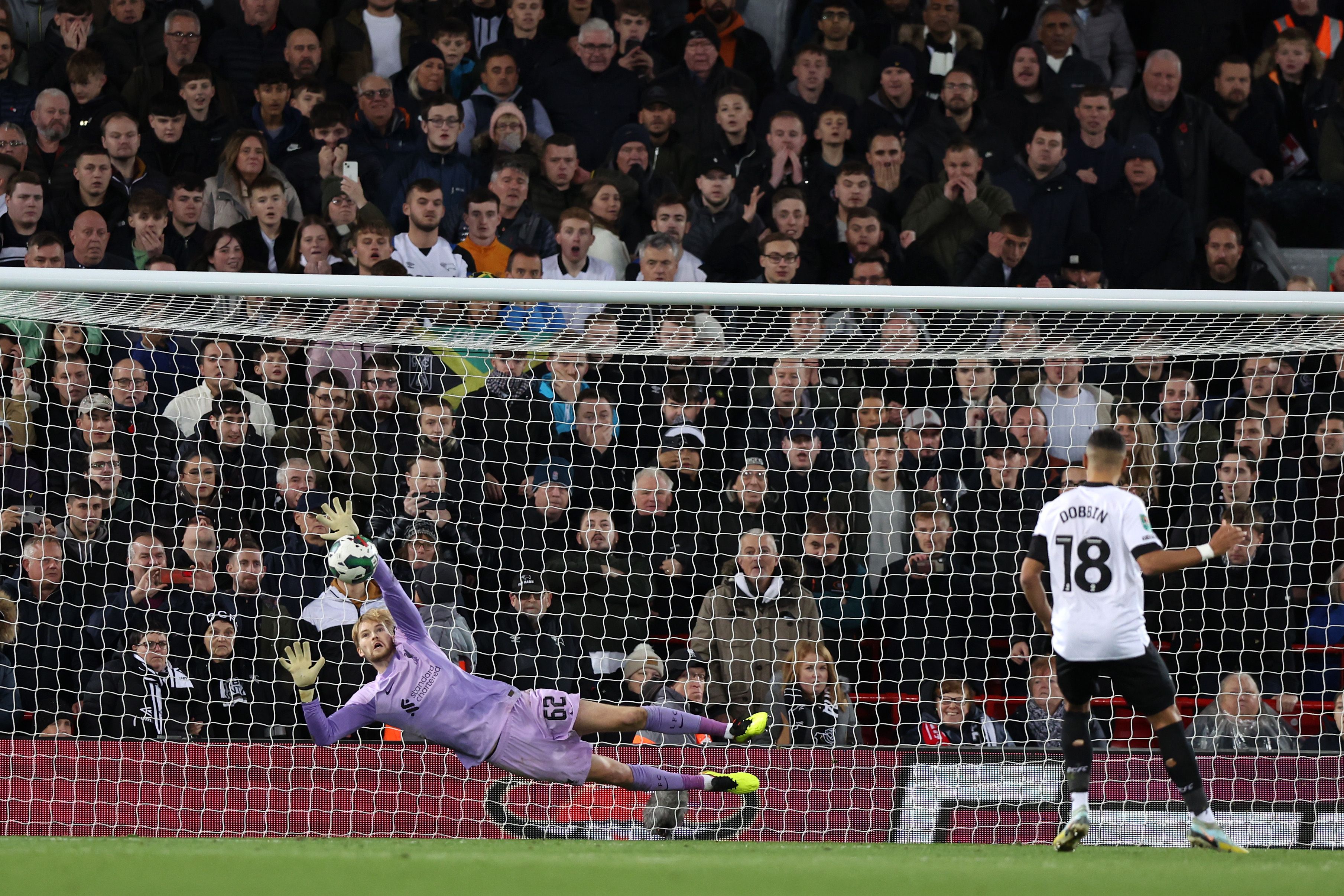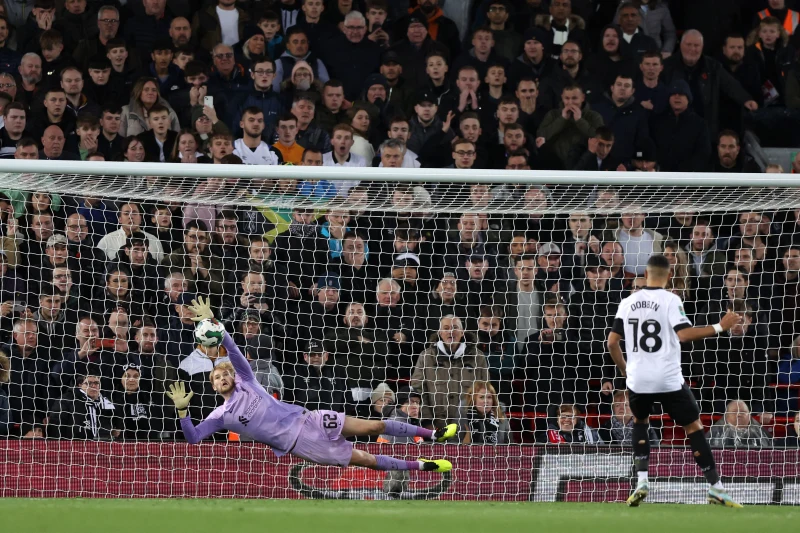The narrative goes that goalkeepers mature later than outfielders and need more time to be truly ready for the step up. There may be exceptions to the rule.
After Harvey Elliott’s impressive turn against Chelsea in the 2021-22 season, only his second-ever EPL start, Jurgen Klopp spoke about how youth can be ready for anything: “When you are old enough to drive a car you should be old enough to play football games! He is in the right place. He's a smart player.” Elliott was 18 years old at the time and the development to here and now is clear as Liverpool hunt for four trophies just as they did back then.
Among those who helped win one of those domestic silver pots against the same opponents was Caoimhin Kelleher. The Irishman got his first big break when the Anfield big boys were away winning the World Club Championship in December 2019.
In the senior prefects’ absence, ‘the kids’ got thumped 5-0 by Aston Villa in the Carabao Cup quarter-final. While the 16-year-old Elliott received accolades for his efforts “as a potential superstar of the future,” 21-year-old Kelleher’s review from This is Anfield’s website was less favourable: “No doubt a perfectionist like most goalkeepers, the Irishman will be frustrated with his role in Villa’s opening two goals.”
Remember, the rules of engagement and criticism are always different for ‘keepers, especially so with youngsters who are stepping into very big or senior boots. Take last season when Southampton’s struggles against relegation forced a change in nets very late in the day.

”A big problem for them has been the goalkeeper they bought in from Manchester City, a young goalkeeper, still finding his way in the game," Jamie Carragher said on Sky. Gavin Bazunu had started 32 games but then gave way to experienced head Alex McCarthy as the Saints went into free fall. Carragher mused: “There’s a lot of young players in there. In fact, there’s too many. There’s too much inexperience. It’s just too much.” Young goalkeepers have to do the heavy lifting for the collective it seemed.
Andy Elleray is the current Lead Academy Goalkeeping Coach at Coventry and has written numerous books on the science of goalkeeping alongside years of experience in youth set-ups in both the male and female game. “Younger goalkeepers can be seen as more error-prone with managers not keen to put them in when a team might be struggling for form.
"The main narrative is around experience and building up a bank of matches, being exposed to different scenarios, going on loans and experiencing different types of football. As players mature, they'll make better decisions, be calmer and less rash with their play.”
This is certainly borne out by the back stories of the current crop. By the age of 21, Jordan Pickford had played in the top five divisions of English football. Pickford’s professional debut was at Darlington, a 17-game roughed-up version of football hell that led to 39 goals concessions and relegation. “In some ways non-league is the hard challenge,” he said. “You are a young lad and you’re having abuse hurled at you. That is what teaches you.”
Dean Henderson was another who featured in the National League North, League Two and League One before he started to catch the eye with Sheffield United in the Championship. He told Manchester United’s website: “You don’t just go into the first team as a goalkeeper through the Academy. It doesn’t work like that.”
James Trafford’s rise from Under-21 European Championship final hero to high-profile regular has come with many rocks and stones too. Vincent Kompany was never worried about Trafford’s ability to prove doubters wrong, but the external noise a big price tag brings together with replacing a fan favourite who helped win the Championship for Burnley is not easy. He dealt with Luton’s recent Friday night bombardment until the very bitter end. Tongues will wag again. That’s the nature of the beast.
Undoubtedly, the experience of positioning, decision-making, situational awareness and just plain, simple growth takes time for such a specialist position. If Mikel Arteta says there are 43 different formations he can play in a game, then there are thousands of scenarios for a goalkeeper to handle throughout a career.
There have been teenage goalkeepers who have been pitched into the big time with outstanding results. Iker Casillas had won two Champions Leagues by the age of 20. It led Sr Alex Ferguson to once say that his maturity was “peculiar” after Real Madrid knocked Manchester United out of the competition.
There is a caveat. Casillas’s wonder boy form had taken a hammering before his spectacular cameo against Leverkusen at Hampden Park in 2002. “Most Goalkeepers who play when they're much younger have an outstanding characteristic,” says Elleray. “For example, Donnarumma was physically ready and capable at 16 years old for AC Milan.”
The school of hard knocks is one that all players pass through. From a goalkeeping perspective, though, there is an increased workload on their position as modern philosophies demand a footballer rather than ‘merely’ a shot-stopper. The idea that the number one is not a physical position is outdated and the growing pains of youth can only accommodate so much.
“Young goalkeepers and players don't physically mature until their early 20s. A robust and movement-heavy position in terms of actions can lead to lots of development through the late teens, causing a loss of power, flexibility and coordination during this phase,” adds Elleray.
The coloured jersey is now so often the first attacker. Never mind the origin of the species designed to be safe and secure. Goalkeepers are multi-dimensional now and where better than to start young.
The new breed are more rounded footballers, so in the next decade, there will be more twenty-somethings like Trafford and Bazunu getting chances to play earlier. They will be better equipped to deal with the burdens placed upon them. Acceptance and trust will surely follow.








